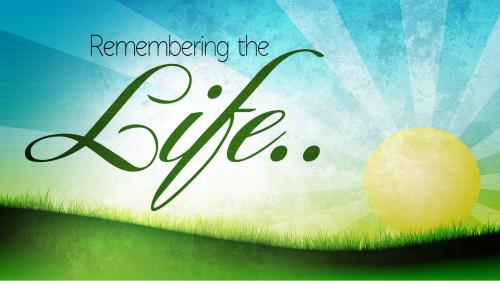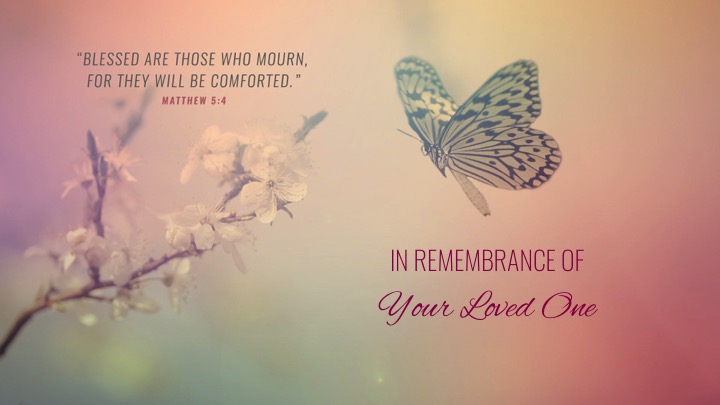-
Taking Hold Of Contentment
Contributed by Joseph Smith on Nov 28, 2017 (message contributor)
Summary: Funeral service for Dock Burgess, whose last day of life was a time of acceptance and calm. We can take hold of contentment by learning to receive, by investing in a relationship with God, and ultimately by accepting grace for life eternal.
I am persuaded that the fundamental human problem is anxiety. I’ve watched the way we live for quite a while, and I am convinced that the most basic human issue is that we are anxious. We are fearful and afraid; we are anxious.
And it is not just that we are afraid of what others may do to us. We are not so much fearful about external things – the economy or terrorism or the environment – all those things that statesmen struggle with. At a much more basic level, we are anxious about ourselves. We worry about whether our lives have meaning. We wonder whether we have done anything that matters. Will anyone remember us when we are gone? Have we made an impact that counts for something? A friend of mine published a book of sermons entitled, “Will It Matter That I Was?” That’s it! That’s what gets to us, that’s what keeps us awake at night, that’s what, in the lonely moments, we are anxious about. Will it matter that we were here? Does my life, short or long, have meaning? Does anybody care, did anybody notice, that I took up space for a while on this planet? Anxiety. It’s our response to a fundamental human question, the question of meaning.
And if, when we struggle with those questions, we can say, “Yes” – Yes, it matters that I was here; yes, someone cares; yes, my life has had meaning – if we can say “yes” about our lives, we can come to the moment of our death content. Satisfied, calm, accepting, and content.
But if we must say, “No” – No, I accomplished nothing; no, no one cares and no one will miss me; no, my life is insignificant – if we must say “no” about our lives, then we end our days agitated, upset, fighting restraints, and profoundly unhappy. I have seen too much of this. I have seen even those who looked very successful come to the end full of doubt, consumed by fears, and hammered by anxiety. Even those you would think of as truly “together” and ready for anything, when the day of their death approaches, sometimes fracture on the shoals of anxiety.
And yet, again, there are those who are content. There are those who are satisfied. There are those who find meaning, who say “yes” to the lives they have led, and who finish their days satisfied, calm, accepting, and content. What makes the difference? Where does this kind of contentment come from? How is it possible, at the end, to say “yes” to your life? How can we take hold of contentment?
Dock Burgess’s final day, so far as we can reconstruct it, speaks to us about this. Let me tell you about last Friday, as told me by his daughter Gloria, and then let me lift up from that final day and from the Scripture some lessons on contentment. I
This last Friday, Gloria went to see her father, and spent some special time with him, making him comfortable and grooming him. He had only recently arrived at the place that is difficult for a good many people to get to – he had arrived at the place where he was comfortable with his daughter taking care of his body. Something in us rebels at that, and Dock was no different from the rest of us. But that had changed, and he submitted to Gloria’s efforts to clean him and serve him.
Gloria tells me that she just felt on that Friday afternoon that she would like to go the extra mile for her dad. Not just cleaning him, but giving him a pedicure and a facial. And not just the pedicure and the facial, but dressing him in charcoal gray slacks and a blue corduroy jacket. And not just the slacks and the jacket, but new sandals, after the pedicure. She says she wishes she had had a camera to record this ninety-two-year-old elegance. He was a picture, in fact, not only of elegance, but also of contentment. There’s our key word – contentment.
And as she left him sitting in the sun, among the flowers, enjoying the gentle breeze, she told him once again what she had told him before, but this time with some extra emphasis, this time with some special urgency. She told him he had been a good father; she reminded him that not only had he loved all his daughters, but that they all loved him. They loved him and appreciated the kind of home he had provided. Speaking for herself and her sisters, she made sure he understood that he had done well for them; he had created an atmosphere of warmth and love and joy, and all of them had drawn from that. All of them had been empowered by his kind of love. She emphasized that with him, and he seemed, this past Friday, content. Calm and content.

 Sermon Central
Sermon Central



